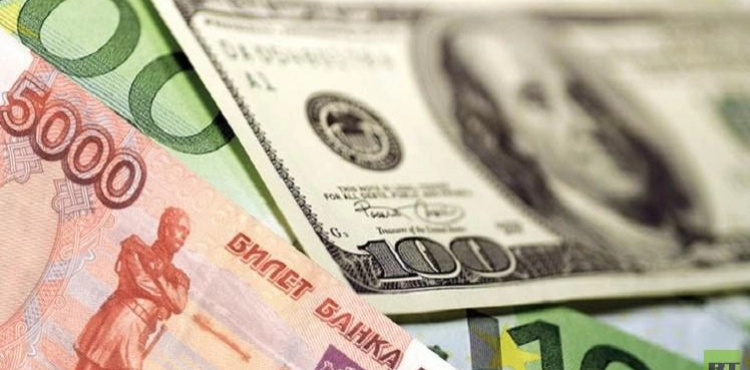Moscow _ Agencies
Moscow is intensifying its efforts to stop the adoption of its economy on the dollar, at a time when Washington is seeking to impose more severe sanctions that would deprive Russia of access to foreign debt markets and cut off its banks ´ green currency.
As long as President Vladimir Putin denounced the dominance of the US currency on the world stage, Russia´s previous efforts to stop the adoption of its economy on the dollar have not been successful so far.
Amid concerns of the Russian business community over a new round of U.S. measures against Moscow against the backdrop of the annexation of Crimea and the conflict in Ukraine, the Russian authorities have now taken concrete steps in the hope of achieving their old goal.
The Ministry of Finance and the Russian Central Bank are expected to soon present to Prime Minister Dmitry Medvedev measures to increase the use of other currencies in international trade deliberations.
"We will inevitably move in this direction," Putin said last month.
"Not because we want to undermine the dollar, but because we want to ensure our security, because they constantly impose sanctions on us and simply deprive us of the opportunity to use the dollar."
Observers warned that the mission to Russia is very ambitious, but a US policy of unpredictability and new U.S. sanctions on Iran and the Washington trade dispute with China could actually help Moscow.
Euler Hermes, a France-based loan insurance company, said in a recent report that a "stop relying on the dollar on a large scale will take time--estimated between one and a half and five years."
Russia´s efforts to stop dependence on the dollar "may be easier now in a world of escalating U.S. protectionism," she said.
Euler Hermes said Russia´s dealings with the European Union (EU) and China--which account for about 60 percent of Russian foreign trade--could be transported to the euro and the yuan, while dealings with former Soviet Union countries could take place in the ruble.
Putin and his Chinese counterpart Shi Jinping have repeatedly reiterated their desire to increase the use of ruble and yuan in cross-border business dealings.
In October, the Russian authorities said they were preparing an agreement on the use of national currencies with China.
According to Ieng, Sino-Russian trade in rubles and Yuan has quadrupled in the last four years, although it still represents about 18 percent.
Deputy Prime Minister Yuri Borisywill said that India will pay for the Russian ground-to-air S-400 missile batteries in rubles.
Russian Central bank governor Elvira Nabolina said she wants to encourage banks to deal with the ruble.
Russia, which has been under U.S. sanctions since 2014, has developed its own financial transactions system to protect itself from a possible ban on the use of the swift International secure messaging Services system.
Dmitry Polifoy, chief economist with the sovereign wealth fund "Russian Direct investment fund", said more trade and vital interactions between countries could strengthen the pattern of abandoning the dollar.
"There has been a natural and real reduction of payments in dollars over the years," Polyfoy told AFP.
He added that the Russian sovereign fund was a "pioneer " in establishing two funds with China for the payment of transactions in national currencies.
He explained, "The first transactions are due in 2019. Similar investment mechanisms can be established in other countries. "
According to the central bank, the percentage of dollar payments for the export of goods and services declined from 80 percent to 68 percent between 2013 and 2017.
At the same time, the percentage of transactions in euros rose from nine percent to 16 percent, while the percentage of transactions in the rouble rose from 10 to 14 percent.
The pattern is less pronounced for imports, with the dollar rate falling from 41 to 36 percent.
Russia will not be able to completely get rid of the dollar soon because its economy is still heavily dependent on oil, which is priced in dollars.
But the country has lowered US government debt stocks by about 80 billion dollars this year.
"Other measures may be to remove major Russian companies from foreign exchanges and increase gold and euro reserves," said Euler Hermes.
Oleg Kuzmin, an economist with Renaissance capital, said there are still many obstacles to the use of national currencies.
"No one needs--for example--the Russian Romans in Croatia and the Croatian currency in Russia," he said.
"But if there is an easy and effective mechanism for converting a currency directly into another currency, then it can work well."












